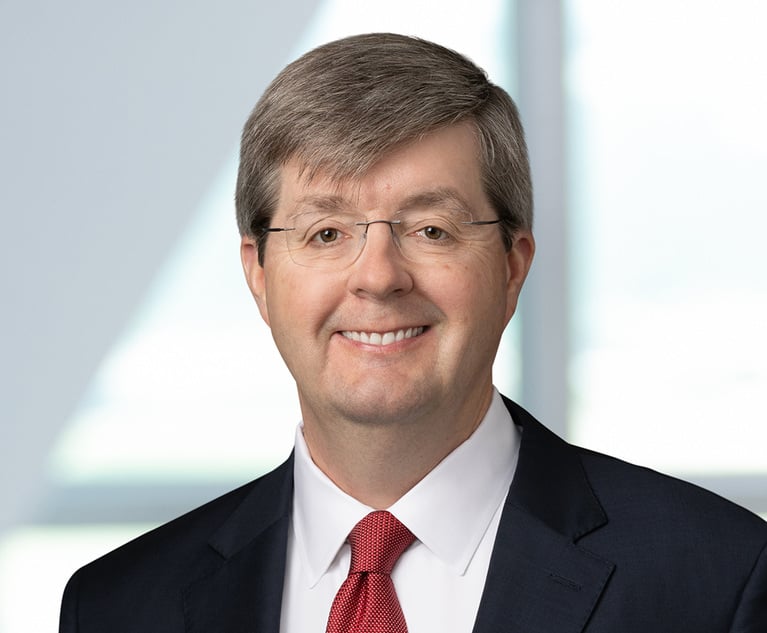How This Fortune 500 GC Is Strengthening Her Law Firm Panel Relationships
Peabody Energy's chief legal officer gives behind-the-scenes insight into what she learned from creating a roster of panel firms and what she thinks of AdvanceLaw's findings on panels through its GC Thought Leaders Experiment.
December 17, 2018 at 08:45 AM
9 minute read

As one of the 25 GCs who signed the Open Letter last year to announce the GC Thought Leaders Experiment, I was very interested to read AdvanceLaw's recent articles on law firm panels. Given the conventional wisdom (including my own) that consolidating outside counsel into a panel of go-to law firms is the right way to go, I was surprised by the finding that panel firms tend to perform worse for clients than non-panel firms (and clients with panels don't receive better service than clients without panels). Here is the key graphic telling that story:

This graphic and related analysis are found here: Law Firm Panels: Are They Designed to Fail? and Law Firm Panels: Are Clients Demotivating Their Law Firms?. Like the authors of these articles, however, I am optimistic about panels, with the caveat that they must be created and managed correctly, which is of course easier said than done. The reason for my article is that I've just finished building out a law firm panel, and I'd like to share what I've learned.
By way of background, I came to Peabody (a Fortune 500 company headquartered in St. Louis) three years ago. Among my top priorities were to examine our law firm relationships and create a tight-knit panel of lead partners and firms that would understand our business, deliver unparalleled service, and collaborate with one another in Peabody's best interests. While I had experience setting up panels (including at my last organization), I chose to partner closely with AdvanceLaw on this—both because of their expertise in law firm relationship management and because we share a philosophy on key priorities like diversity and innovation. (I was also able to leverage their core model—basically giving our law firms an even larger financial incentive to over-perform on service quality. In AdvanceLaw's system, clients like us evaluate firm performance, and strong scores help firms win more work from other AdvanceLaw clients.)
Rather than focus on the mechanics of how we selected and manage our panel, I'd like to share a few insights I've gained along the way.
Observation #1: My New Perspective on Panel Size
Going into this exercise of consolidating spend in fewer firms, my initial bias was to make the panel even smaller than where we landed; I was thinking six to seven firms for our U.S. work. In the end, however, I'm pleased we added a few extra firms, landing at a baker's dozen. Expanding the pool allowed me to insert a few more midsize and non-money center firms than I otherwise could have. And that's been incredibly helpful—just a few months in, I'm noticing that those firms are extra eager to impress and put forth their top talent. This is consistent with what Bill Deckelman (GC of DXC Technology) observed in his thoughtful article about staffing leverage and how hard it is to “win the war for talent” at certain types of firms. For example, I've been very impressed so far with Husch Blackwell, Thompson Hine, and Bryan Cave Leighton Paisner, three firms I wasn't too familiar with until they made it onto our panel.
The larger panel size has also allowed us to have more than one firm in each key legal area, so no firm feels it has a lock on the work. As much as we're all full of hope and optimism during the RFP process, the reality is that things can and do go wrong, even with established relationships. At this point, six months into our three-year panel, we are already seeing some firms going above and beyond what we heard from them during the selection process, and others not quite living up to their potential. Basically, having two firms in key areas of work has been helpful—otherwise we may have had to go off-panel more during this three-year term, defeating the purpose of this convergence exercise.
Observation #2: The Strong Bias Toward Rubberstamping Firms
While my in-house team and internal business clients are exceptionally professional and look at outside counsel relationships objectively, I still felt pressure as we put our panel together to select incumbents, even ones that performed poorly during the selection process. This goes to the issue of client-switching costs—discussed in this insightful article about the legal market—which can cultivate complacency. We were ultimately able to overcome this tendency, and we let go of many firms we knew well. It wasn't easy—these relationships felt locked-in, especially with internal clients, and a number of firms were disappointed not to make the cut.
But at the end of the day, we were committed to a fair process to find the firms that were best for us. My advice or observation is that we clients have to be especially vigilant about this, otherwise we are expending a lot of effort and may end up with the result in the graphic above. One other thing that helped us overcome the rubberstamping issue was to pilot a few new firms as part of the RFP process. This unusual practice allowed us to gain confidence around prospective new firms, rather than overly default to incumbents.
Observation #3: The Need to Elevate Diversity, Innovation and Other Values
I am heavily committed to diversity in the legal profession, and to supporting firms that are making real (sometimes disruptive) investments in improving client service. Throughout the process, however, there were times when it felt easier to let innovation and diversity go by the wayside. This is not because of a lack of commitment, but because there are so many factors to consider over the course of a several-months-long process—things like firm expertise, rates, geography, prior performance, written RFP responses, interviews, etc., as well as divided stakeholders and internal politics.
Given these competing interests, it was important that we expressly made innovation and diversity two of our key selection factors at the outset, and we reminded ourselves of those factors at the top of every key meeting. By keeping these priorities at the forefront across the entire process, including explicitly scoring law firms on both criteria (resisting the temptation to think of them as “intangibles” or “value adds”), we were better able to achieve these goals. If we hadn't been so incredibly intentional about this, I'm confident our panel would not have embodied these principles.
Observation #4: The Need to Find the Right Relationship Partners
A key aspect of how I wanted our panel to operate is to have a dedicated “cabinet” of experts—the lead relationship partners from each firm. These would be partners we got to know and trust, who would have the company's back, and be strong advocates for Peabody within their own law firms. (Notably, diversity was something we prioritized here, as well, and the majority of relationship partners at our panel firms are diverse lawyers.)
It was our way of doing what AdvanceLaw refers to as becoming a “client of choice.” I take the role of relationship partner seriously. Too many times, I (and other general counsel I know) have seen bonds with firms erode because relationship partners aren't providing the attention and care we expect and require. Related, and to ensure a tight connection with our relationship partners, we established an internal relationship partner within the legal team for each panel firm. The internal and external relationship partners are forging tight bonds and are in close communication.
Significantly, in a couple of cases while building our law firm panel, we included an incumbent firm only after insisting on a different relationship partner from the one we had before. It was awkward, but necessary to make a relationship work. For what it's worth, I think firms should make this much easier for clients to do—it can otherwise be a major impediment to a client's use of a great law firm.
Observation #5: The Importance of Getting Work To All Panel Firms
Once the firms made our panel (with a couple firms as go-to firms in each key legal area), I felt (or hoped) that we'd naturally start using all these firms. Granted we're just six months in, and it takes time, but I think it's important for us, and clients more broadly, to anticipate this issue. As noted by Firoz Dattu and Aaron Kotok in their second panels article, clients with panels often don't have time to look for the best lawyer on the panel as work comes up, and this can generate complacency in some firms (the firms automatically retained) and resentment in other firms (the firms not receiving as much work). I understand why it happens, but what good is all the work that goes into forming a panel if we're not retaining the lawyers with the best expertise, or we demotivate some of our firms? The way we're starting to address this is through dashboards that show which firms are getting what work, how well each firm is performing, which firms are furthering our diversity goals, etc. The plan is to review these dashboards as a leadership team to ensure that each panel firm receives significant work and the opportunity to impress and earn more work.
So those are some of my early observations or insights, and I am excited to see how things continue to evolve. Overall, I have been delighted and encouraged by the results we're already seeing, and the commitment by our panel firms (a.k.a. strategic partner firms) to get to know us and our business. In terms of what else is next, I am looking to implement a number of the techniques discussed in AdvanceLaw's second panel article by year end, such as convening a law firm summit, and sharing performance feedback and scorecards with the firms to drive a culture of continuous improvement.
A. Verona Dorch is executive vice president, chief legal officer, government affairs and corporate secretary at Peabody Energy.
NOT FOR REPRINT
© 2025 ALM Global, LLC, All Rights Reserved. Request academic re-use from www.copyright.com. All other uses, submit a request to [email protected]. For more information visit Asset & Logo Licensing.
You Might Like
View All
Eversheds Sutherland Adds Hunton Andrews Energy Lawyer With Cross-Border Experience
3 minute read
Bracewell Adds Former Pioneer Natural Resources Lawyer to O&G, Energy Transition Practices
2 minute read
Who Got the Work: Gibson Dunn and Wilmer to Defend BlackRock in ESG Antitrust Lawsuit
2 minute read
Vinson & Elkins: Traditional Energy Practice Meets Energy Transition
4 minute readTrending Stories
Who Got The Work
J. Brugh Lower of Gibbons has entered an appearance for industrial equipment supplier Devco Corporation in a pending trademark infringement lawsuit. The suit, accusing the defendant of selling knock-off Graco products, was filed Dec. 18 in New Jersey District Court by Rivkin Radler on behalf of Graco Inc. and Graco Minnesota. The case, assigned to U.S. District Judge Zahid N. Quraishi, is 3:24-cv-11294, Graco Inc. et al v. Devco Corporation.
Who Got The Work
Rebecca Maller-Stein and Kent A. Yalowitz of Arnold & Porter Kaye Scholer have entered their appearances for Hanaco Venture Capital and its executives, Lior Prosor and David Frankel, in a pending securities lawsuit. The action, filed on Dec. 24 in New York Southern District Court by Zell, Aron & Co. on behalf of Goldeneye Advisors, accuses the defendants of negligently and fraudulently managing the plaintiff's $1 million investment. The case, assigned to U.S. District Judge Vernon S. Broderick, is 1:24-cv-09918, Goldeneye Advisors, LLC v. Hanaco Venture Capital, Ltd. et al.
Who Got The Work
Attorneys from A&O Shearman has stepped in as defense counsel for Toronto-Dominion Bank and other defendants in a pending securities class action. The suit, filed Dec. 11 in New York Southern District Court by Bleichmar Fonti & Auld, accuses the defendants of concealing the bank's 'pervasive' deficiencies in regards to its compliance with the Bank Secrecy Act and the quality of its anti-money laundering controls. The case, assigned to U.S. District Judge Arun Subramanian, is 1:24-cv-09445, Gonzalez v. The Toronto-Dominion Bank et al.
Who Got The Work
Crown Castle International, a Pennsylvania company providing shared communications infrastructure, has turned to Luke D. Wolf of Gordon Rees Scully Mansukhani to fend off a pending breach-of-contract lawsuit. The court action, filed Nov. 25 in Michigan Eastern District Court by Hooper Hathaway PC on behalf of The Town Residences LLC, accuses Crown Castle of failing to transfer approximately $30,000 in utility payments from T-Mobile in breach of a roof-top lease and assignment agreement. The case, assigned to U.S. District Judge Susan K. Declercq, is 2:24-cv-13131, The Town Residences LLC v. T-Mobile US, Inc. et al.
Who Got The Work
Wilfred P. Coronato and Daniel M. Schwartz of McCarter & English have stepped in as defense counsel to Electrolux Home Products Inc. in a pending product liability lawsuit. The court action, filed Nov. 26 in New York Eastern District Court by Poulos Lopiccolo PC and Nagel Rice LLP on behalf of David Stern, alleges that the defendant's refrigerators’ drawers and shelving repeatedly break and fall apart within months after purchase. The case, assigned to U.S. District Judge Joan M. Azrack, is 2:24-cv-08204, Stern v. Electrolux Home Products, Inc.
Featured Firms
Law Offices of Gary Martin Hays & Associates, P.C.
(470) 294-1674
Law Offices of Mark E. Salomone
(857) 444-6468
Smith & Hassler
(713) 739-1250










